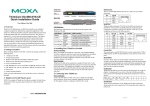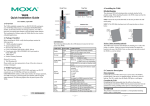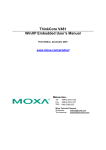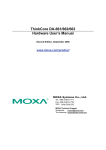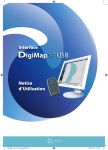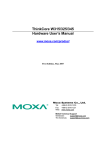Download Moxa Technologies V481-XPE User's Manual
Transcript
Rear View LED Name Power ThinkCore V481-XPE Quick Installation Guide Storage First Edition, November 2007 LAN 1 LAN 2 1. Overview The ThinkCore V481 is an industrial, ready-to-run embedded computer that supports VGA and audio, and comes with dual LAN ports, 8 serial ports, a CompactFlash slot, and a USB port. The V481 is based on the Intel x86 processor. The VGA interface makes the V481 especially well-suited for industrial applications, such as SCADA, factory automation, and applications that require an onsite HMI or monitor. Top View Optional Accessories y Switching power adaptor for the ThinkCore V481: 60W, 24 VDC output, 100 to 240 VAC input (power cord must be ordered separately); Order No.: 1117224250210 y Power Cords: Power cord with Australian plug; Order No.: 1705010700510 Power cord with UK plug; Order No.: 1705010700410 Power cord with Euro plug; Order No.: 1705010700210 Power cord with straight US plug; Order No.: 1705010700110 NOTE: Notify your sales representative if any of the above items are missing or damaged. Wall or Cabinet Mounting The ThinkCore V481 has built-in “ears” for attaching the embedded computer to a wall or the inside of a cabinet. We suggest using two screws per ear. DIN-Rail Mounting An aluminum DIN-Rail mounting kit is a standard accessory. If you need to reattach the DIN-Rail mounting kit to the ThinkCore V481, make sure the stiff metal spring is situated towards the top, as shown in the following figures. Follow Steps 1 and 2 to mount the V481 on the DIN-Rail. STEP1: Insert the top of the STEP2: The DIN-Rail attachment DIN-Rail into the slot just below the unit will snap into place as shown. stiff metal spring. Front View To remove V481 from Din-rail, simply reverse Steps 1 and 2. LED Indicators There are 6 LED indicators located on the front panel of the ThinkCore V481. 3. ThinkCore V481 Panel Layout 5. Connector Description Power Connector Connect the 9 to 36 VDC LPS or Class 2 power line to the ThinkCore V481’s terminal block. If the power is properly supplied, the Power LED will light up. Grounding the V481 Grounding and wire routing help limit the effects of noise due to electromagnetic interference (EMI). Run the ground connection from the ground screw to the grounding surface prior to connecting the power. The following figures show the panel layouts of the ThinkCore V481. P/N:1802004810020 —1— LED Function Power is on No power is being received, or Off power error exists Data is being written to or read Yellow/Blinking form the storage unit Off Storage unit is idle Yellow Tx/Link Link LED Disconnected, or short circuit Off exists Orange 1000 Mbps Ethernet Mode (LAN2 Only) (Gigabit Ethernet) Mode LED Green 100 Mbps Ethernet Mode Off 10 Mbps Ethernet Mode 4. Installing the ThinkCore V481 2. Package Checklist Before installing the ThinkCore V481, verify that the package contains the following items: y 1 ThinkCore V481 y Quick Installation Guide (this guide) y Document and Software CD y Din-rail Mounting Kit y 100 cm RJ45-to-RJ45 Ethernet Cross-over Cable y 20 cm Y-type Cable for Keyboard and Mouse (CBL-MiniDIN6P/6Px2-20) y Terminal Block to Power Jack Converter (includes Terminal Block) y Product Warranty Statement LED Color Green —2— —3— ATTENTION This product is intended to be mounted to a well-grounded mounting surface, such as a metal panel. SG: The Shielded Ground (sometimes called Protected Ground) contact is the right most contact of the 3-pin power terminal block connector, as viewed from the angle shown here. Connect the SG wire to an appropriate grounded metal surface. VGA Connector The ThinkCore V481 comes with a D-Sub 15-pin female connector to connect a VGA CRT monitor. PS/2 Connector The ThinkCore V481 has a PS/2 connector for a PS/2 keyboard or PS/2 mouse connection. This 6-pin mini-DIN connector has the following pin assignments. PS/2 Connector Pin No. Signal Definition 1 PS/2 keyboard data 2 PS/2 mouse data 3 GND 4 VCC 5 PS/2 keyboard clock 6 PS/2 mouse clock A Y-type cable is included as a standard accessory for connecting a PS/2 keyboard and PS/2 mouse at the same time. Ethernet Ports Both the 10/100 and 10/100/1000 Mbps Ethernet ports use RJ45 connectors. Pin Signal 1 ETx+ 1 8 2 ETx3 ERx+ 6 ERxSerial Ports The serial ports use DB9 connectors. Each port can be configured by software for RS-232, RS-422, or RS-485. The pin assignments for the ports are shown in the following table: Pin RS-232 RS-422 1 2 3 4 5 6 7 8 DCD RxD TxD DTR GND DSR RTS CTS TxDA(-) TxDB(+) RxDB(+) RxDA(-) GND ------- RS-485 (4-wire) TxDA(-) TxDB(+) RxDB(+) RxDA(-) GND ------- —4— RS-485 (2-wire) ----DataB(+) DataA(-) GND ------- 1 2 3 4 5 6 7 8 9 SO-DIMM Socket for Memory Module The ThinkCore V481 has an internal 200-pin SO-DIMM socket for installing a DDR SDRAM memory module. The V481-XPE comes with a 512 MB DDR SDRAM Module pre-installed. You may also replace the module with your own (128 MB to 1 GB) DDR SDRAM memory module. To replace the module, first remove the bottom cover of the V481 to expose the SO-DIMM socket. Compact Flash Socket The ThinkCore V481-XPE comes with a built-in 1 GB industrial CompactFlash card to store the WinXP Embedded operating system. A second CompactFlash socket is located inside the V481. Installing a second CompactFlash memory card will not affect the operating system. Remove the bottom cover of the V481 to install the second CompactFlash card. USB Hosts The ThinkCore V481 supports two USB 2.0 hosts. Both hosts are UHCI, Rev. 2.0 compliant and support Plug & Play and also hot swapping. Both hosts can be used to connect any USB device, such as a keyboard, mouse, USB flash disk, or USB CD-ROM. In addition, both USB ports support system boot up, which is activated by changing BIOS settings. Audio Interface The ThinkCore V481 has an audio interface that follows the AC97 standard and supports speaker output and audio line input. Power On/Off Button The power on/off button is located above the power input terminal block. The button supports the ATX power on/off function. By default, the button is set for “instant off.” You may also configure the button for “delay 4 seconds” to guard against shutting down the power unintentionally. In this case, you must press the power button continuously for at least 4 seconds to shut off the power. ATTENTION There is a risk of explosion if the battery is replaced by an incorrect type of battery. 6. Powering on the V481 To power on the V481, connect the “terminal block to power jack converter” to the V481’s DC terminal block (located on the left rear panel), and then connect the power adaptor. Note that the Shielded Ground wire should be connected to the right most pin of the terminal block. It takes about 30 seconds for the system to boot up. 7. Starting the V481 Power on the V481 after connecting a monitor, keyboard, mouse, and checking that the power source is ready. Once the operating system boots up, the first step is to configure the Ethernet interface. The factory default settings for the V481’s dual LANs are shown below. You can use a cross-over Ethernet cable to connect directly from the PC to the V481 to test if the LAN settings are correct. LAN 1 LAN 2 (Gigabit) Default IP Address 192.168.3.127 192.168.4.127 Netmask 255.255.255.0 255.255.255.0 8. Configuring the Ethernet Interface Follow these steps to configure the Ethernet interface: Step 1: [My Device] Æ [Control panel] Æ [Network Connections] to enter the network setting page. Step 2: Right-Click the LAN interface (e.g., Local Area Connection 2) to configure and click property. A configuration window will pop up Step 3: After inputting the proper IP address and netmask, click OK. Reset Button The reset button is designed to warm reboot the V481. Pressing the Reset button initiates a hardware warm reboot. The button plays the same role as a desktop PC’s reset button. After pressing the reset button, the system will reboot automatically. During normal use, you should NOT use the Reset Button. You should only press the Reset Button if the software is not working properly. To reset the system, work from the operating system environment by using the corresponding software reboot function to protect the integrity of data being transmitted or processed. Real-time Clock The embedded computer’s real-time clock is powered by a lithium battery. We strongly recommend that you NOT replace the lithium battery yourself. If the battery needs to be changed, please contact the MOXA RMA service team. —5— Copyright © 2007 Moxa Systems Co., Ltd. All rights reserved. Reproduction without permission is prohibited. Tel: +886-2-2910-1230 Fax: +886-2-2910-1231 www.moxa.com [email protected] —6—


